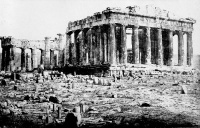Ancient history
From The Art and Popular Culture Encyclopedia

|
"Eggs, milk, rice, and honey, onions, succory, leeks, and garlic, the leaves of the vine, radishes, and carrots, with other growths of the garden, formed the staple articles of diet among ancient peoples."--The Pleasures of the Table (1902) by George Herman Ellwanger |
|
Related e |
|
Featured: |
Ancient history is the study of the written past from the beginning of recorded human history in the Old World to the Early Middle Ages in Europe.
The span of recorded history is roughly 5,000 years, with Cuneiform script, the oldest discovered form of writing, from the protoliterate period around the 30th century BC. This is the beginning of history, as opposed to prehistory, according to the definition used by most historians.
The term classical antiquity is often used to refer to ancient history since the beginning of recorded Greek history in 776 BC (First Olympiad). This roughly coincides with the traditional date of the founding of Rome in 753 BC, the beginning of the history of ancient Rome, and the beginning of the Archaic period in Ancient Greece. Although the ending date of ancient history is disputed, Western scholars use the fall of the Western Roman Empire in AD 476, the death of the emperor Justinian I, the coming of Islam or the rise of Charlemagne as the end of ancient and Classical European history.
Outline
See also
- Antiquity
- Ancient art
- Ancient literature
- Classics
- Classical Antiquity
- Historiography
- Human evolution
- Prehistoric man
- Prehistory
- Protohistory
- Historiography


